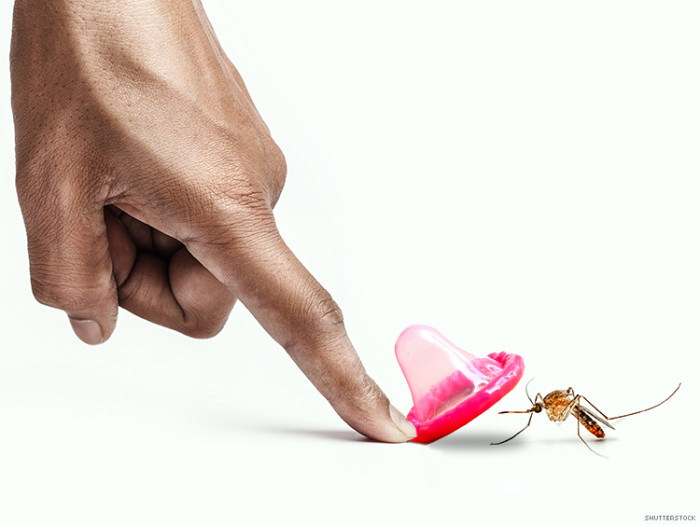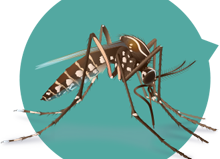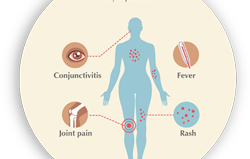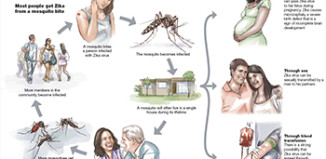Zika and Sexual Transmission
Basics of Zika Virus and Sex
- A man with Zika virus can pass it to his female or male partners during vaginal, anal, or oral (mouth-to-penis) sex without a condom.
- Zika can be passed from a man with symptoms to his sex partners before his symptoms start, while he has symptoms, and after his symptoms end.
- Men with Zika who never develop symptoms may also be able to pass the virus to their sex partners.
- Zika virus can stay in semen longer than in blood, but we don’t know exactly how long Zika stays in semen or how long it can be passed to sex partners.
Basic Prevention
- Condoms can reduce the chance of getting Zika from sex if used correctly from start to finish, every time you have vaginal, anal, or oral (mouth-to-penis) sex.
- Not having sex eliminates your risk of getting Zika from sex.
Fast Facts
- A man with Zika virus can pass it to his female or male sex partners.
- Using condoms or delaying sex can reduce the risk of getting Zika from sex.
- The length of time to consider using condoms or delaying sex depends on your situation and concerns.
What We Do Not Know
There are some things we still do not know about Zika and sex.
- We don’t know if a woman with Zika can pass the virus to her partners, during vaginal or oral (mouth-to-vagina) sex.
- We don’t know if Zika can be passed through saliva during kissing.
- We don’t know if Zika passed to a pregnant woman during sex has a different risk for birth defects than Zika transmitted by a mosquito bite.
CDC and other public health partners continue to study Zika virus and how it is spread and will share new information as it becomes available.
How to Prevent Sexual Transmission of Zika
Couples Who Are Pregnant
Pregnant couples with male partners who live in or travel to areas with Zika should take steps to protect their pregnancy. A man who has Zika can pass it to his pregnant partner during sex, even if he does not have symptoms at the time or his symptoms have gone away.
Because Zika can cause birth defects, these couples should
- Use a condom every time they have sex or not have sex during the pregnancy. To be effective, condoms must be used correctly from start to finish, every time they have sex. This includes vaginal, anal, and oral (mouth-to-penis) sex.
- Take steps to prevent mosquito bites[PDF – 2 pages] while in an area with Zika. This protects the couple and prevents further spread of the virus.
- Even if they do not feel sick, travelers returning to the United States from an area with Zika should take steps to prevent mosquito bites for 3 weeks so they do not pass Zika to uninfected mosquitoes.
Not having sex can eliminate the risk of passing Zika during a pregnancy.
Pregnant couples who are concerned that the male partner may have or had Zika should tell their healthcare provider immediately about:
- His travel history
- How long he stayed
- If he took steps to prevent mosquito bites
- If they had sex without a condom
Couples Trying to Become Pregnant
Men or women who live in or travel to an area with Zika who are concerned about trying to get pregnant should talk to their healthcare provider.
Others Concerned About the Sexual Transmission of Zika
Anyone concerned about the sexual transmission of Zika and not concerned about pregnancy can consider using a condom every time they have vaginal, anal, and oral (mouth-to-penis) sex or not have sex. To be effective, condoms must be used correctly from start to finish, every time during sex.
For couples with a male partner who has traveled to an area with Zika
- If the male partner has been diagnosed with Zika or has (or had) symptoms, the couple should consider using condoms or not having sex for at least 6 months after symptoms begin.
- If the male partner does not develop symptoms, the couple should consider using condoms or not having sex for at least 8 weeks after the man returns.
For couples with a male partner living in an area with Zika
- If the male partner has been diagnosed with Zika or has (or had) symptoms, the couple should consider using condoms or not having sex for at least 6 months after symptoms begin.
- If the male partner has never developed symptoms, the couple should consider using condoms or not having sex while there is Zika in the area.
For couples with a non-pregnant female partner who lives in or has traveled to an area with Zika
- It is not known if a woman can pass Zika to her sex partners.
- These couples can also consider using condoms or not having sex.
Couples who are not pregnant and are considering these options should weigh the personal risks and benefits, including
- The mild nature of the illness for many people*
- The man’s exposure to mosquitoes while in an area with Zika
- Plans for pregnancy (if appropriate) and access to contraception
- Access to condoms
- Desire for intimacy, including willingness to use condoms or not have sex
- Ability to use condoms or not have sex
*In many cases, Zika does not cause any symptoms or causes only mild symptoms lasting several days to a week. Severe disease requiring hospitalization is uncommon.
Sexual Transmission and Testing
- CDC recommends Zika virus testing for people who may have been exposed to Zika through sex and who have Zika symptoms.
- A pregnant woman with possible exposure to Zika virus from sex should be tested if either she or her male partner develops symptoms of Zika.
- Testing blood, semen, or urine is not recommended to determine how likely a man is to pass Zika virus through sex. This is because there is still a lot we don’t know about the virus and how to interpret test results. Available tests may not accurately identify the presence of Zika or a man’s risk of passing it on.
- As we learn more and as tests improve, these tests may become more helpful for determining a man’s risk of passing Zika through sex.








